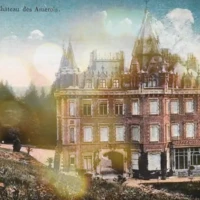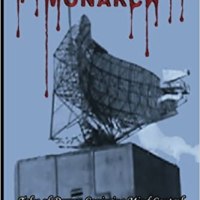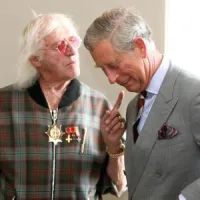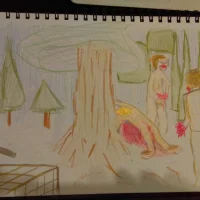Charles Scott Napier was working for the British Council, teaching in Egypt.
He was caught out when a letter was found, from him, during a police raid, at the home of David Bloomfield. In it were boasts of child abuse. The letter is referred to in this transcript.
Bloomfield was being investigated for his links to Peter Righton, and the documentary mentioned “Children at Risk” was on Peter Righton.
The appeal by Napier was turned down.
My next post will draw a few of these threads together.
Charles Napier is the half brother of John Whittingdale, who has been in the Conservative Government.
Redaction
Some court reports have had victims names redacted and some assault details redacted.
This is a difficult balance – normally I would think that I should not “censor” details but on consultation with various people I have taken the decision to redact. This is mainly to protect victims, their friends and relatives from unnecessary detail and to stop the gratification of those who seek salacious details.
In addition to the obvious “victims redaction” to protect victims details, there may also be “assault redaction” across most of the spectrum of abuse. The assaults are left in the charges, but mainly redacted when repeated with reference to the individual. I have also redacted unnecessary detail of assaults.
Redaction may obscure sometimes the legal reason for the appeal, but should make no large difference to the vital information for researchers that these documents contain. That vital information is mainly names of the perpetrators, past addresses, institutions where assaults occurred, the actual charges the perpetrators faced, and dates – on which newspapers are pathetically inaccurate and this information enables the links between people and places and abuse at various times to be ascertained.
Some transcripts may have been subject to automatic reading software and whilst effort has been made to correct these, the text should not be regarded as definitive. Common mistakes in reprinting here are that quotation marks are sometimes not correct, replaced by odd symbols.
If you think that the balance is not correct or that a particular redaction needs reconsideration, please say.
This appeal is unredacted by cathy fox blog
Index of Newspaper and Journal articles on this blog [1]
Index of Court Appeals on this blog [2]
[1995] EWCA Crim J1208-8 IN THE COURT OF APPEAL CRIMINAL DIVISION
No: 95/5861/Z4
Royal Courts of Justice, Strand, London WC2
Before: Lord Justice Russell Mr Justice Rougier and His Honour Judge Rhys Davies QC (Sitting as a Judge of the Court of Appeal)
Regina v Charles Scott Napier
MISS Z SMITH appeared on behalf of the Appellant
MR B KELLY appeared on behalf of the Crown
(Computer Aided Transcript of the Stenograph Notes of John Larking, Chancery House, Chancery Lane,
London WC2 Telephone No: 071 404 7464 Official Shorthand Writers to the Court)
JUDGMENT (As Approved by the Court)
Transcript [1995] EWCA Crim J1208-8
Friday 8th December 1995
JUDGMENT
MR JUSTICE ROUGIER: On 14th August 1995 at Kingston-upon-Thames Crown Court, the applicant was convicted on two counts of indecent assault upon a male person,and was sentenced to 9 months’ imprisonment concurrent on each.
His application for leave to appeal against that conviction has been referred to the Full Court by the learned Single Judge.
The principal ground of proposed appeal centres around a television programme which was made on the subject of paedophiles in general, and a man called Righton in particular, sometime before the trial of the applicant. It is necessary to set out the dates in some detail. At some stage, we are not told exactly when, but it is in all probability in 1994, the police raided the house of Righton, and they discovered a whole lot of photographs of naked boys, together with letters written by the applicant, which indicated that he too shared Righton’s proclivities and therefore he came under suspicion. At about the same time a documentary was being made by the BBC on the subject of Righton and child abuse, called “Children at Risk”.
The complainant in the applicant’s case, whom we shall refer to as D, made a statement under the Criminal Justice Act implicating the applicant in March 1994. The film was shown on relatively prime time at 8.00 p.m. on 1st June 1994, but it was not until 10th January 1995 that the applicant was arrested and, as already stated, his trial took place in August.
By the first two grounds of proposed appeal the complaint is made, baldly, that in the light of that television film a fair trial was not possible, it had been gravely prejudiced, and that the learned judge was wrong in failing to stay the proceedings on the grounds that publicity had rendered a fair trial impossible, all the more so because the prosecution, in the form of the police, had assisted in the adverse publicity. That reference was to the fact that while the film was being made and researches were being done, the Hereford, Worcester and West Midlands police co-operated by passing relevant information to the maker of the film.
In relation to that the learned judge was faced with a problem of some difficulty. There undoubtedly had been a film which had identified the applicant on three occasions. This Court has had the benefit of seeing the relevant extracts. They occupy approximately 9 minutes in all, in a transmission totalling some 55 minutes and undoubtedly the applicant is portrayed as a paedophile. He is indeed referred to as somebody who had been convicted of a paedophilic offence, if there is such a word, which was quite true.
There also were photographs of him in the company of young boys in Sweden and there are some extracts from letters which he had written to Righton, describing with almost gloating pederasty the physical appearance and availability of young boys either under his charge or within his influence.
The learned judge, in a very careful ruling, marshalled the pros and cons, and having referred to the relevant authorities he noted that the prosecution were not seeking, as part of their case, to adduce evidence concerning the applicant’s involvement in paedophile organisations, it having been alleged in the transmission that at some time he was the treasurer of something called the Paedophile Information Exchange. He noted, as we too have been able to note, that D did not appear on the television programme, he was not named and he made no specific allegation of indecent assault against the applicant. The learned judge correctly squared up to the problem in these words:
“The question I have to resolve is whether there is a real prospect that one or more jurors may have seen and remembered the television programme so far as it relates to the defendant and if so whether, in those circumstances, the defendant could possibly receive a fair trial.”
He noted that it was unsatisfactory that publicity adverse to the defendant was made at a time when there were reasonable grounds to believe that a prosecution was pending or contemplated but that, as my Lord has pointed out, is a disciplinary matter and had nothing to do with the problem which the learned judge had to resolve. He went on to say this:
“I have to bear in mind also that the television programme and reports took place some fourteen months ago.
I have to consider the likelihood of whether they were seen or remembered by members of the jury and I also have to consider what safeguards or precautions might usefully be taken in respect of the jury.
At the end of the day I have come to the conclusion that, provided jurors confirm that they neither have any knowledge of this defendant nor any other prosecution witness and provided they are given an appropriate warning in the summing-up in accordance with the state of the evidence as it develops to the effect that they must consider only the evidence heard in Court and nothing extraneous should be taken into consideration, then in my view a fair trial of this defendant is possible and it follows that I am therefore not persuaded, as matters stand, that he cannot have a fair trial”
He thereupon rejected the submission.
As a matter of later history, it should be said that no possible criticism could be or has been made as to the way in which the learned judge dealt with the matter in his summing-up.
It is a strongly held, which has been the subject of a good deal of research notably from the Legal Faculty of Sheffield University, that the capacity for retaining material either heard on the wireless or seen on the television, on the part of the avid viewer, is remarkably short. The jury were asked the appropriate questions and all denied any recollection or knowledge of the matters which had so worried Miss Smith, acting for the applicant. They were duly empannelled.
We think that it is very difficult to see that the learned judge could have done other than he did, and we cannot see that any possible criticism can be levelled at the decision to which he came.
There is no conceivable suspicion that he failed to take into account all the relevant matters and, in particular, possibly the most telling feature supporting his decision was the fact that the transmission had taken place no fewer than 14 months before the trial. If it is to be said that whenever, during a subject of great public concern, an investigative team of journalists of one sort or another do make public matters which certainly indicate that serious crimes have been committed, that they are thereby insulating the perpetrators of those crimes from prosecution, that is not something with which this Court can possibly agree.
Accordingly we find there is no substance in those first two grounds.
The third ground is really an adjunct of the first two, because after the complainant had completed his evidence, it was noted that there had been a number of occasions when he had been referred to as being interviewed by a television producer and it is feared that that might have reminded any member of the jury who had seen the programme and had forgotten about it about the adverse publicity. By the same token, we are of the view that it is extremely unlikely that this would have had any effect, and the learned judge cannot be criticised at that stage for thinking that the trial could still be conducted fairly and that any possible prejudice could be cured by an accurate summing-up.
Finally, Miss Smith relies on part of a letter which was written by the defendant to a friend of his called Bloomfield when these matters were being investigated. There is a reference to ‘witch hunting’ in the letter and an Evening Standard article. It is complained that by reason of the fact that the learned judge allowed that letter to be exhibited, the defendant had been effectively precluded from giving evidence in his own defence because he would have to explain what the witch hunt was all about and thereby again remind the jury of the previous highly adverse television programme.
The prosecution in seeking to adduce that part of the letter submitted to the learned judge that it was capable of being an admission relating to the very crimes which were alleged in the case, and the learned judge took the view that it was entirely a matter for the jury to consider whether it did amount to some sort of admission or whether, on the other hand, they took the view that it did not, in which case they would disregard it. In our judgment, he was perfectly correct in that ruling, and since the prosecution had already announced that they did not intend to rely on any of this applicant’s paedophile associations as part of their case, the fear that he would have to explain what was meant by “witch hunt” seems to us more imaginary than real.
In those circumstances we think that the learned judge’s ruling was perfectly correct. There is no merit in this application and it must be refused.
Please note that victims of abuse may be triggered by reading this information. These links are generally UK based.
- The Sanctuary for the Abused [A] has advice on how to prevent triggers.
- National Association for People Abused in Childhood [B] has a freephone helpline and has links to local support groups.
- One in Four [C]
- Havoca [D].
- Useful post on Triggers [E] from SurvivorsJustice [F] blog.
- Jim Hoppers pages on Mindfulness [G] and Meditation [H] may be useful.
- Hwaairfan blog An Indigenous Australian Approach to Healing Trauma [J]
- Survivors UK for victims and survivors of male rape or the sexual abuse of men [K]
- Voicing CSA group [L] helps arrange survivors meetings in your area
- A Prescription for me blog Various emotional support links [M]
- ShatterBoys -“Male Survivors Of Childhood Sexual Abuse Inspiring change, Through Shared Experience Whilst Building Connections…Together We Can Heal” [N]
Links
[1] Index of Newspaper and Journal articles on this blog https://cathyfox.wordpress.com/2015/05/23/newspaper-stories-index-timeline/
[2] Index of Court Appeals EWCA on this blog https://cathyfox.wordpress.com/2015/05/08/a-timeline-of-court-and-ewca-documentation-on-cathy-fox-blog/
[A] Sanctuary for the Abused http://abusesanctuary.blogspot.co.uk/2006/07/for-survivors-coping-with-triggers-if.html













Reblogged this on Floating-voter.
LikeLiked by 1 person
Pingback: Heroes for Exposing Child Sexual Abuse – Part 1 – Peter McKelvie | cathy fox blog on child abuse
Pingback: Criminologist Dr Rachel Hoskins formerly Dr Richard Hoskins | goodnessandharmony
Pingback: An Index and Timeline of Court and Court of Appeal Documents on Cathy Fox Blog | cathy fox blog on child abuse
Pingback: Heroes for Exposing Child Sexual Abuse – Part 1 – Peter McKelvie / by Cathy Fox blog | goodnessandharmony
Were in Sweden did Napier work?
LikeLiked by 1 person
Hi, No idea sorry if it is not in the transcript
LikeLike